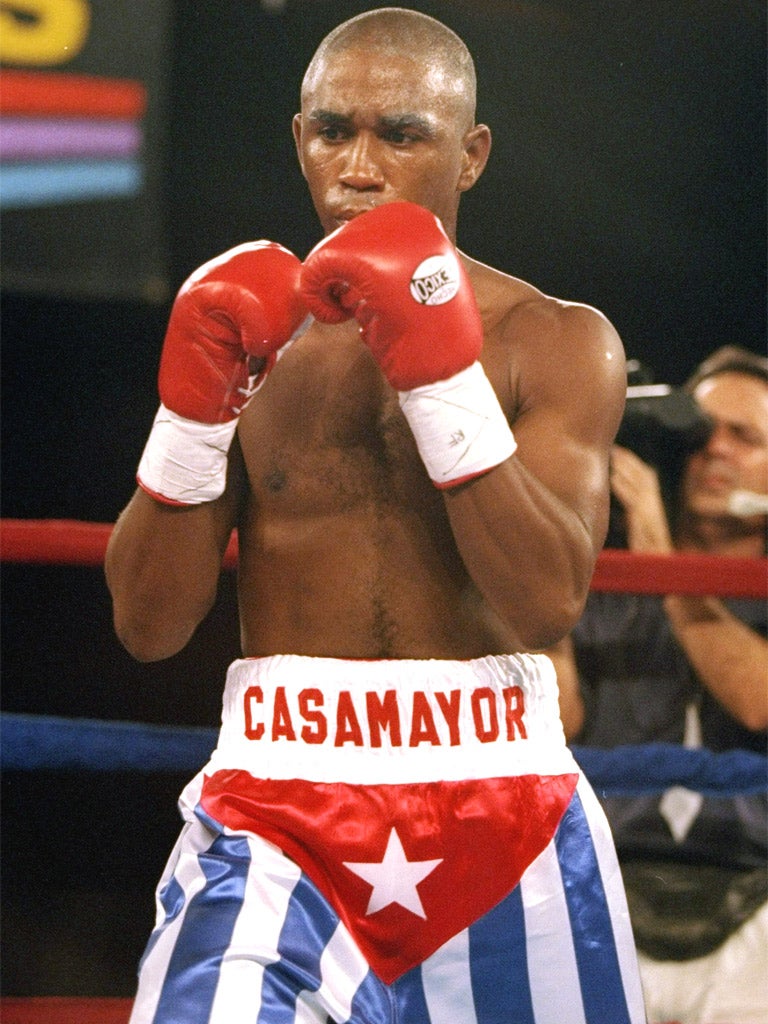Steve Bunce on Boxing: Pro-am series poised to revolutionise Cuban game

Your support helps us to tell the story
From reproductive rights to climate change to Big Tech, The Independent is on the ground when the story is developing. Whether it's investigating the financials of Elon Musk's pro-Trump PAC or producing our latest documentary, 'The A Word', which shines a light on the American women fighting for reproductive rights, we know how important it is to parse out the facts from the messaging.
At such a critical moment in US history, we need reporters on the ground. Your donation allows us to keep sending journalists to speak to both sides of the story.
The Independent is trusted by Americans across the entire political spectrum. And unlike many other quality news outlets, we choose not to lock Americans out of our reporting and analysis with paywalls. We believe quality journalism should be available to everyone, paid for by those who can afford it.
Your support makes all the difference.Cuban boxing made a comeback at the Olympics in London last year and now there is a chance that a form of professional boxing could return to the giant halls in Havana after a 50-year gap.
In 1962 Fidel Castro was instrumental in banning the sport of professional boxing. It was considered "vicious, exploitative and corrupt" and Resolution 83-A outlawed it and made redundant the few remaining active professionals. Most of the quality professionals, men such as Jose Napoles, had moved to America the year before.
At about the same time, a Russian adviser, Andrei Chernevenko, in the country to help Castro's young nation stay safe from a Yankee invasion, helped launch the amateur programme.
It took less than decade for the Cubans to become the greatest amateur boxing nation, rulers of the Olympic ring and arguably sport's most dominant squad.
During the last 20 years a lot of the best Cuban amateurs have come in from the cold, often absconding from training camps dressed as women or climbing over walls and dashing to waiting helicopters. Guillermo Rigondeaux, Joel Casamayor and Yuriorkis Gamboa, all exceptional Olympic champions, absconded to glory, taking a lot of young fighters with them.
The defections sucked the heart and soul out of the Cuban system and at the Beijing Olympics in 2008 the mighty nation failed to win a gold in the boxing ring. In Athens, four years earlier, they had won five, but three of their gold medal heroes had defected. In London last year, with security improved during the previous Olympic cycle, there was a gold medal haul of two and a few controversial losers. The Cubans were back.
It now seems likely that a Cuban team will take part in next year's World Series of Boxing tournament and that Cuban boxers are expected to join the unique APB league when it is launched later this year.
The WSB allows amateur boxers to compete over five rounds of three minutes each round, without vests or headgear. The boxers receive money for each fight, there is a bonus for a win and to all intents and purposes the men are full-time professionals. However, the boxers retain their amateur status and can compete in their domestic championships and, crucially, the Olympic Games.
The APB will extend the pro-am concept with boxers taking part in eight- and 10-round contests and still being eligible for the Rio Olympics in 2016. It is, make no mistake, professional boxing and the potential global franchise owners are desperate to have Cubans in their teams.
The slick and suited men who run the amateur sport − it is no longer officially called amateur boxing –have been in Cuba during the last week and it looks like a deal or two has been done to return professional boxing to the country. In the Seventies various American promoters offered the recently deceased three-time Olympic champion Teofilo Stevenson millions of dollars to fight Muhammad Ali. Stevenson famously replied: "What is a million dollars compared to the love of the Cuban people?" Big Teo was Castro's right-hand man.
A few years before professional boxing was outlawed, Castro actually had the great heavyweight champion Joe Louis as his guest at the New Year celebrations at the end of 1959. Louis became a paid "tourism" ambassador for the Cuban Government. Louis, who was revered in black America, worked with a firm that tried to turn Cuba into a holiday destination. As Louis said about Cuba: "A Negro can go in the wintertime without discrimination." The idea never worked and Louis resigned his role after Castro posed this question: "What would happen if the Negroes in the Southern US, so often lynched, were each given a rifle?" It is said that Louis was reminded of his tax debt just before leaving his job in 1960.
A lot has changed in Cuba since Castro's early years and the return of one form of professional boxing could stop the draining defections.
Join our commenting forum
Join thought-provoking conversations, follow other Independent readers and see their replies
Comments